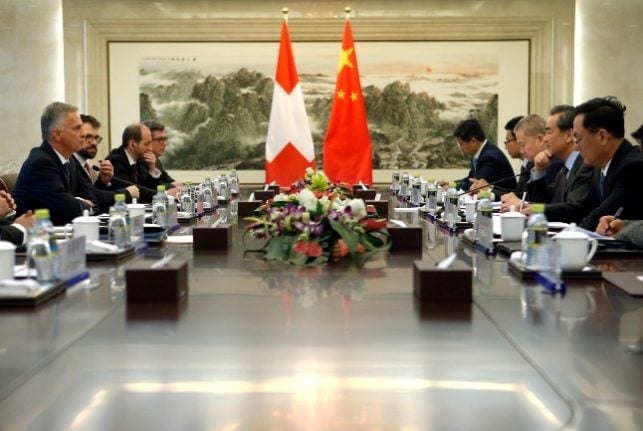CHINA
Swiss claim China deal posed no threat to dissidents
The Swiss strongly rejected accusations this week that a deal allowing Chinese officials to enter Switzerland and interrogate Chinese nationals, which only recently came to light, put dissidents at risk.
Published: 12 December 2020 09:19 CET

Chinese Foreign Minister Wang Yi meets Swiss Foreign Minister Didier Burkhalter in Beijing in 2016. Photo: Mark Schiedelbein/POOL/AFP
Switzerland entered into a so-called re-admission agreement with China back in 2015. The deal expired on Monday.
The agreement, which remained a secret until Swiss newspaper NZZ divulged its existence in August, specified the terms for Chinese officials to travel to the country and interrogate Chinese nationals set for deportation.
Asia-focused rights group Safeguard Defenders this week published the text of the deal, plus a report about how it differed from similar agreements with other countries, and could pose a threat to “those the Chinese government wants to be returned”.
The details coming to light are “going to tarnish Switzerland's reputation”, Peter Dahlin, who heads the organisation, told AFP.
Following the initial revelation of the agreement in August, since-jailed Hong Kong dissident Joshua Wong weighed in on Twitter, decrying the secretive nature of the deal.
“Five years after the secret deal was signed, no Swiss MP had ever heard of the deal,” he tweeted on August 24, warning that “dissidents in exile” from Hong Kong, Taiwan and elsewhere, could risk extradition to China.
'Standard practice'
The Swiss migration ministry meanwhile flatly denied that there was anything secretive about the China deal, insisting it was a standard, “technical arrangement” like the ones it had reached with some 60 other countries.
While the agreement had never been posted publicly like many such deals, it “can be obtained on request at any time”, it said in a statement.
Ministry spokesman Reto Kormann also stressed to AFP in an email that persons seen as threatened, like Uighur Muslims or Tibetans, would not be considered for expulsion, and “would not be questioned by Chinese officials”.
He explained that readmission agreements were needed because “most states are only willing to take back their own citizens if they can verify their identity”.
“Accordingly, such interviews are standard practice in Switzerland as in other European states.”
The China deal had been put to use only once in the past five years, in 2016, the ministry said. During that mission, “two Chinese officials stayed in Switzerland for several days to interview a total of 13 people”, it said.
The Swiss migration ministry had expected to renew the agreement before it expired on December 7. But it said is was not worried it had lapsed, stressing it was possible to invite in foreign delegations even without it.
After the deal came to light back in August, left-leaning parties called for more oversight, and the issue will now be discussed by parliament in the coming months.
After that, ministry spokesman Daniel Bach told AFP, talks with Chinese authorities about reinstating the deal would begin. “It is in Switzerland's interest to renew this agreement,” he said.
'Misleading'
The Safeguard Defenders report meanwhile maintained that Switzerland's deal with China was in no way like its agreements with other countries.
The report compared Switzerland's deal with China to the ones it has with Sweden, India, Hong Kong and Britain, and said it found glaring differences.
“It differs so much,” Dahlin said, that comparing it to typical readmission agreements “is itself misleading”.
While such agreements are usually reached with immigration departments or foreign ministries, the deal with China was reached with its public security ministry, which handles immigration, but also police and intelligence matters.
The Chinese “experts” sent in are not immigration bureaucrats, but “agents”, Dahlin said, adding that the deal allowed them to “roam freely, conduct interviews and interrogations unsupervised”.
He warned the agents could conceivably also move freely throughout Europe's passport-free Schengen area, which “would obviously be a major concern for the capitals in the countries around Switzerland”.
Kormann however stressed that the Swiss migration ministry plans the duration of assignments, and the duration of the visas accordingly.
Hua Chunying, a spokeswoman for the Chinese foreign ministry meanwhile told AFP the criticism of its agreement with Switzerland was based on “a misinterpretation of the facts”.
“Other European countries engage in similar cooperation with China,” she said.
Url copied to clipboard!


 Please whitelist us to continue reading.
Please whitelist us to continue reading.
Member comments